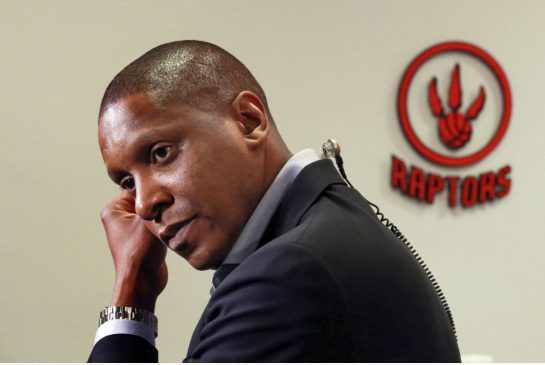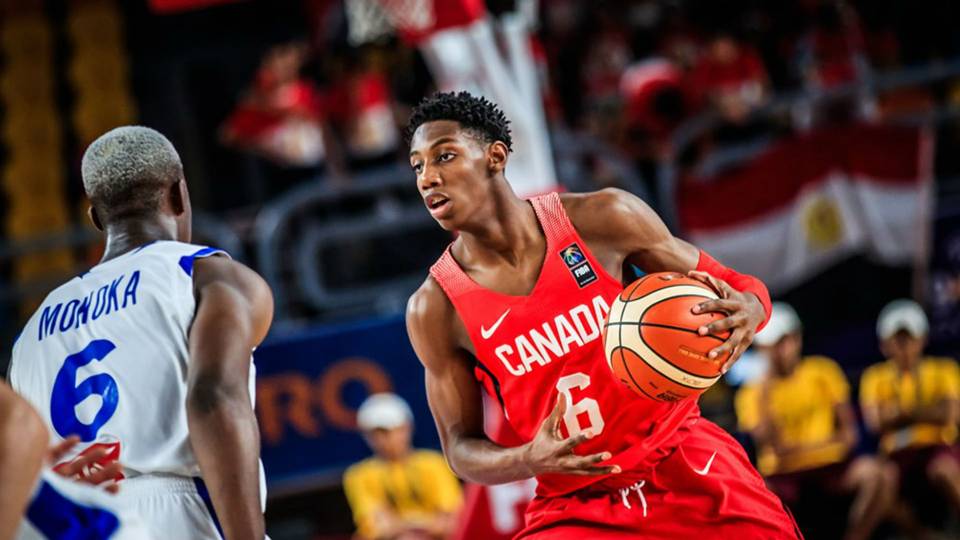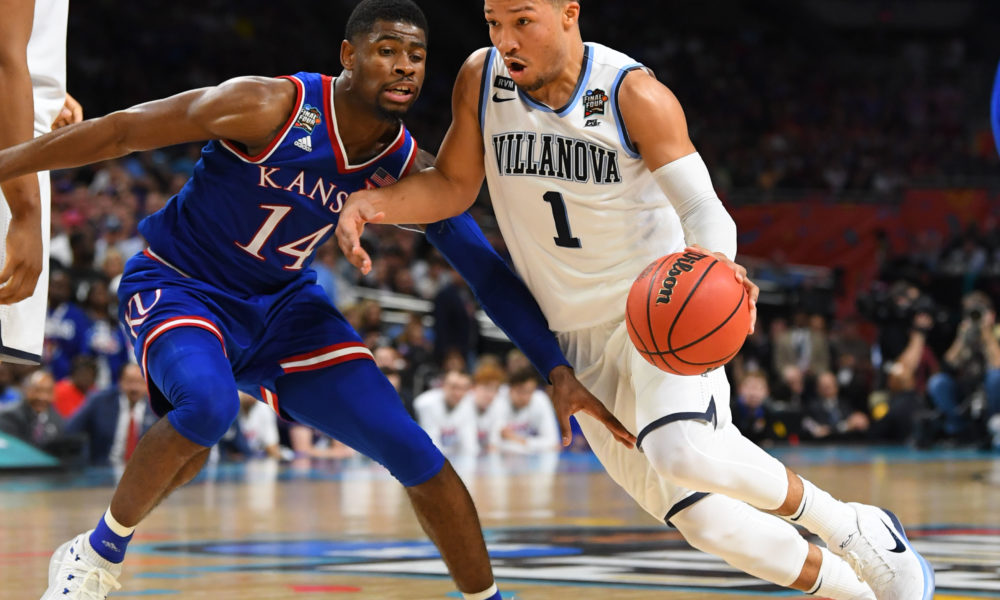You can keep up with all of our player reviews here.
I’m getting really tired of reading and hearing about how the pressure is on Masai Ujiri this summer, or how he is now on the hot seat, or that somehow the next three months are his first real test as the president of the Toronto Raptors. Statements like these not only wholly undermine all the work that Ujiri has done so far to elevate the Toronto Raptors from irrelevancy, but they also overstate the importance of a single summer where the Raptors are fairly restricted in what they can do. Is this an important summer for Masai Ujiri? Yes, but when you are running a franchise worth more than one-billion dollars, every summer is important.
This is something that people tend to lose sight of when they allow their recency bias to overrule their memory banks. Ujiri has faced the free agency of his biggest players three times (twice with Kyle Lowry, once with DeMar DeRozan), has dealt with the Raptors getting swept out of the Playoffs twice before, and has made many bold calls with regards to his coach (especially opting to keep him in the face of some not-insignificant opposition). Yes, this spring he decided to switch coaches, but people act as though the decision to change coaches is somehow terribly more impactful than the decision not to. Or that he’s putting himself out there to a greater degree by replacing him. Last year, Ujiri saw his team get swept by Cleveland, opted to keep Casey around and force a new playing style onto him, and watched his club get swept again by Cleveland twelve months later. Had Ujiri fired Casey last season, brought in a new coach to improve the team’s fortunes, and saw them get swept by Cleveland, then semantically how would that have been any different?
The point I’m trying to make is that every summer team executives effectively choose who is going to make up their roster and their coaching staff. Sometimes that choice is to keep people, sometimes that choice is to replace them. Regardless, it’s a choice every time. Often one is not inherently more defensible than the other unless you’re talking about keeping or acquiring an historically great talent. Ujiri played it one way last year, and decided to play it a different way this year. To say that his choice this year has somehow significantly altered or exposed him compared to last year is to put far too much stock in the value of idleness. This is not about Ujiri not facing pressure to produce this summer, this is about the fact that Ujiri has a pressure to produce every summer. To think otherwise is absurd.
If anything, current circumstances have given Ujiri as free a path as he’s had since the day he came back to Toronto. The back-to-back sweeps at the hands of the Cavaliers have put into stark relief how ill-equipped the Raptors are to seriously challenge elite-level talent in the Playoffs. Nick Nurse, the freshly-anointed head coach, wants to utilize a more innovative system in an attempt to close some of that gap, but the NBA is a players league and there is a lot of evidence to suggest that Kyle Lowry and DeMar DeRozan are not the players that are going to thrust Toronto into the postseason elite. Does that mean Ujiri is obligated to trade them? No, it does not. What it does mean is that if he chooses to, much like his decision with regards to Casey, he will have an easier time justifying his decision than he’s had since 2013.
Really, the door is wide-open for Ujiri right now. He designed the contract structure of the roster to fly open in 2020, when Lowry, Jonas Valanciunas, Serge Ibaka, and C.J. Miles will see their contracts end and release about $82-million from Toronto’s cap. However, circumstances have afforded Ujiri an opportunity to move that schedule up, in a manner of speaking, by jettisoning expensive talent to any number of ends. He could export talent in an attempt to shed salary and acquire draft picks. He could look to move laterally by swapping another team’s expenses for his. He could look to package some of his young players for more top-line talent. He could also, of course, make no dramatic move and give Nurse a chance to fully implement his system with the parts that Casey couldn’t push to meaningful Playoff success this spring. There are no shortage of fans that would love to see Ujiri make a bold play, shipping out one of the team’s stars for no other reason than to move past an era where the Raptors have been regular season darlings and Playoff duds. History would suggest that Ujiri brings the whole gang back, but that’s only because Ujiri has never really faced a situation like this as a team president before.
Which is really what people mean when they start talking about how the pressure is on Ujiri this summer. To this point, Ujiri has inherited teams with enough composite talent to compete just hard enough to prevent a full-scale reimagining. He’s been free to nip-and-tuck around the edges because he’s never had a team that was so bad or so inept that it required a full-scale dismantling. In that way, we don’t even really know what a Masai Ujiri team looks like. His Nuggets played an aggressive, up-tempo style, but nearly all Nuggets teams play that way. He wanted the Raptors to play more in that style, but he built a roster around two isolation-heavy guards and retained a coach that didn’t see the game like that. Before last week, he’d never had to hire a new coach, which means that he never had to emphatically state “this is how I want my team to play.” Technically, retaining George Karl and Casey in Denver and Toronto, respectively, does say that, but clearly not with the same emphasis.
However, another reason that we haven’t seen Ujiri force his stamp on one of his team’s is because he doesn’t have a style. He’s an executive, not a coach. He doesn’t need to have a style. His job isn’t to pick a way of playing and only acquire those kinds of players. His job is to acquire the best players he can, and surround those players with the best compliments that he can secure. Ujiri is a pragmatic executive. If he excels at anything, it’s at playing the hand that he is dealt about as well as you could ask him to. He doesn’t look to put his stamp on his teams, he looks to make the best team that he can with the tools that he has available. Which is why, if you are trying to handicap what he’ll do this summer, your best bet is to bet on more or less everyone returning. That isn’t because that’s his ideal outcome, it’s because it is the most likely outcome. It’s the most likely outcome because it’s very hard to acquire really talented players, and when you do (like Oklahoma City acquiring Paul George last year), there are often considerable strings attached. The Raptors are not operating from a position of strength. They do not have A-1 coveted assets. Without that, it’s hard to make an impactful move without assuming a tremendous amount of risk by doing so.
Now, that doesn’t mean Ujiri can’t make an impactful move. If he can, you had better believe that he will. However, unlike his recently-disgraced predecessor, he won’t mortgage the farm to do it. He wanted Serge Ibaka, but rebuffed the obscene demands of the Thunder when he tried to trade for him. Ujiri is not a ‘make a move at all costs’ kind of executive. If a move presents itself that will improve the team, you can bet that he’ll make it. That such a trade hasn’t happened in the last few years speaks to their scarcity. Now, the value that Toronto places on their current pieces, guys like Lowry and DeRozan, may have changed in recent months, which may change the calculus on what Ujiri considers an “improvement” to the team, so that’s worth keeping in mind. What’s key, though, is whether that value has changed outside of the Raptors organization, as well.
If people want to turn this summer into a referendum on Ujiri’s ability as a team executive, that’s their prerogative. It’s stupid, but stupid is in vogue these days. Ujiri should be evaluated for every move he’s able to consummate and for his ability to consummate enough moves to keep his team competitive. He seems enamoured of Nurse’s eagerness to try and out-innovate his competitors, which speaks to a certain risk appetite that may presage bolder moves to come, but that doesn’t mean Ujiri’s neck is any more out there than it has been over the last five years. It’s better to look towards this summer with curiosity. This is a situation that has similarities to previous offseasons for Ujiri, but it also has enough uniqueness to allow the world to add to their picture of the man in charge of the Raptors. Ujiri could go any one of a number of ways with the Raptors this summer, just remember that standing pat is the most likely outcome, regardless of how much invented pressure people want to lay on him for the next three months.



